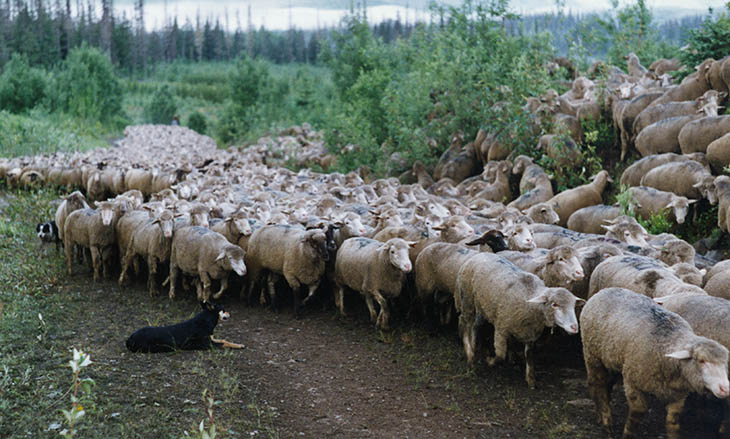This article was originally published at the defunct Skepticblog.org on Sep 6, 2011. An archived version is available here.

Llamas! I mean, sheep. I used to know a lot about these critters, back in the 1990s when I took this picture.
But for my family and I, there was a major silver lining: the 144th Saanich Fair! Western Canada’s longest running agricultural fair, the Saanich Fair has been a tradition in my family since—well, since about the 110th Saanich Fair. There’s a special kind of life satisfaction that can only arise when you gaze in wonder upon prize pumpkins and blue ribbon pies. It casts a powerful nostalgic spell. The scents of hay, dust, and manure. The cooing rows of fancy pigeons, each more Darwinian than the last. Teams of draft horses. Supporting the Lions Club through the delicious means of volunteer-sold midway hotdogs. Hearing the screams of teenagers spun, flipped, shaken, and dangled upside down for no good reason. It’s all so familiar and magical—the pleasure of being transported back to childhood (especially now that I have a child of my own to share it with).
But that sense of time travel is an illusion. Which brings me to my topic for today: the fading of expertise.
Agricultural fairs aren’t just for fleecing teenagers with unwinnable midway games (if only crookedness were to blame for my dismal zero-for-three performance at slingshot paintball yesterday, but alas, I was just terrible at it). Events like the Saanich Fair are opportunities for professionals in agricultural production to gather, sell their products, compete for valuable recognition in their fields, and show off their hard-won expertise. Everyone exhibiting—from the 4H kids meticulously hand-combing their steers for auction to the big business equipment manufacturers to the folks competing in the 20-odd categories within the “Chrysanthemum Division” (check out the prize list PDF)—everyone showing at the fair either brings expertise, or is at the start of a path to acquire it.
In what already seems like another lifetime, I could have been one of them. Some of you know that I made my living as a professional shepherd for about 10 years. But leaning on the fence at the fair near all those prize sheep, I was forced once again to confront the truth that I’m a sheep expert no longer.
We were walking over toward the sheep with my five-year-old when he accidentally referred to them as “llamas.” It was just a slip of the tongue, but my wife and I pounced on him with laughing mock horror: “Llamas?! No son of two shepherds will call sheep ‘llamas’ on our watch! Time to begin your education, young man!”
It did my heart good to see my boy gently communing with the sheep. But as I pointed things out to him and answered his questions, I became more and more aware how hazy my knowledge had become. It’s only been a decade since I last worked in the industry, but a decade is a long time. “Wow,” I confided to my wife. “I feel like I can barely tell a wether from a ewe.” Answers that would once have been right there were elusive. Chatting idly with one of the sheep producers, I felt almost nervous: what if she asks something hard?
Expertise is ephemeral. It’s like muscle mass: hard to build, fast to fade away. That’s the truth of it—and that is why UFO author Stanton Friedman’s insistence on being identified as a “nuclear physicist” (or even “the flying saucer physicist”) is so questionable. Friedman earned his MSc. in 1956, but has not, if I understand his career correctly, worked in physics since before I was born. It’s presumably fair to consider him a current expert on the UFO literature; but I would not assume that his knowledge of physics is up to date.
Returning to my own knowledge of sheep, badly faded after just 10 years: I would add that even at the height of my knowledge—a time when my colleagues and I could laughingly boast, “Our kung fu is the best!”—my expertise was very specific. As Barbara Drescher has explained, “It is only at the highest levels of competence that we understand where our gaps in knowledge are. Becoming an expert at anything takes about ten years of study or practice–10,000 hours. Don’t accept less.” I logged that many hours, and became all too aware that my ignorance about sheep was (even then) larger than my knowledge.
What I did was a specialist trade: “silvicultural shepherding” as part of the “sheep vegetation management industry.” I knew how to look after herds of a certain size (1500-2000), including only ewes of breeding age, on landscapes of a certain type (Northern British Columbia tree plantations), during summer months only (100 hours a week!), within a certain type of industry (forestry) for a certain purpose. That stuff I knew very well, by the end—but that’s a tiny splinter of a sub-specialty. An apprentice I trained went on to manage lambing barns; when I visited her on her turf, she was the master, and I was the clueless tourist. My father was trained and certified as a woolclasser, an expert trade about which I know nothing (expert knowledge that he, like Stanton Friedman, let lapse before I was born). I recall a discussion I had with an older, more experienced shepherd from the French Pyrenees about our relative skill sets. I had to agree: in nearly every respect, his knowledge of sheep was superior (and I was quick to borrow as many of his tricks as I could work out). It was only in our shared area of sub-specialty that we were peers.
All moot now, of course. Experience may never fade completely, but it fades quickly—and a lot. Leaning on the fence at the Saanich fair, I was forced to admit that I’m not a current expert on sheep. Today I’m just another city slicker, gawking at the country fair.